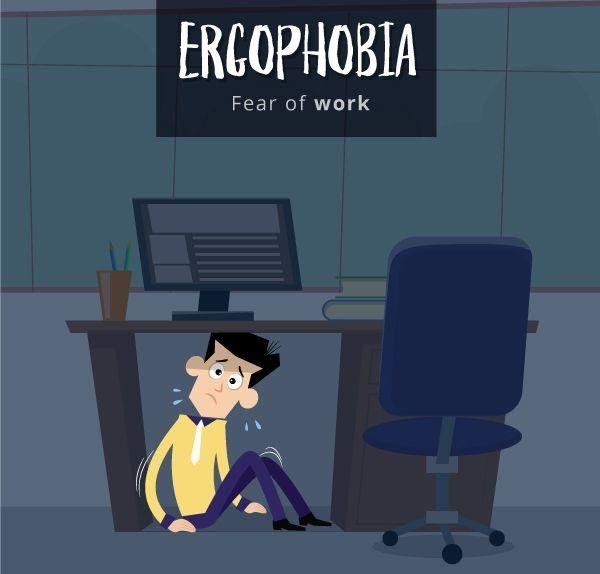You may have heard about someone who feels uncomfortable at his workplace, a shy one who can’t deal with a team, or a person who gets easily nervous about work-related things. But what if it escalates and turns out to be a sufficient reason to resign? Introducing you to the… Ergophobia!
What Does Ergophobia Mean?
The literal meaning of Ergophobia originally derives from combining the two Greek words Ergon (Work) and Phobos (Fear). The medical definition directs to the persistent fear of work. Fear may be a combination of fears, such as fear of failure at a specific assigned task, fear of group speaking, or fear of socializing with co-workers.
Sometimes, it turns out to be the fear of being accepted for a certain job position. Imagine attending an interview and wishing in your deep heart to be rejected, it surely sounds weird, right? Ergophobia was previously defined by William Upson, the American author of The Art of Laziness. In some cases, this phobia turned out to be a general fear of commitment to an exact workplace.

Photo Via: yourdost.com
The Actual Cause of Struggle
When researchers tried to approach the exact cause of Ergophobia, all the reasons seemed irrational. All shreds of evidence lead to two main factors: the genetic makeup and personal environment.
Families with a history of mental illness may have a higher chance of developing this disorder and have a higher chance of genetic predisposition to developing mental illness. Experiencing a sort of traumatic event can accelerate the blow of Ergophobia.
Likewise, the surrounding environment, AKA those who have baleful effects on others, causes psychological pressure in the work environment. It may end people with phobias abandoning their work instead of sticking to it.
The Ergo-Symptoms
People may experience undue anxiety about the workplace environment, even though they may realize their fear to be irrational. Symptoms may vary, but what all patience agreed on was the overwhelming feeling of:
- Dread
- Tachycardia
- Uncontrollable light-headed feeling.
- Excessive sweating of palms
- Difficulty in breathing
- Dizziness
These all come in a pack of anxiety symptoms when escalated can translate into a full-blown panic attack.
One person diagnosed with Ergophobia mentioned that fear does link to performance-related issues. For instance, the individual could embrace the fear of oral presentations, an unbearable ability to meet deadlines, or any work-related mission.
How to overcome?
Some call it tips. Others call it a treatment!
The Ergophobia cases require a unique prescription, all start at the hands of you, as an employer to your employees, followed with other personal exercises as the following:
- Provide them with adequate training: a key factor responsible for Ergophobia is the lack of skills. Once you realize that the employees need guidance, then train them!
- Reward them: the lack of appreciation works as the primary factor of lessening personal self-confidence. If you eyed an initiative of hard work, acknowledge your employees right away.
- On the personal facet, work on improving your own yourself. Work on your work-life balance, add an extracurricular fun activity whenever you feel depressed. Finally, if things bounced to be seriously uncontrollable, seek medical counseling.
Work phobias may sound superfluous. Work-shy people are actually under fire at their workplace and opt-out. Enlighten your mind with the sufferings of your surrounding colleges and employees and head to ProQuest Ergophobia research.
If you feel that any of the above symptoms speak to you, please seek professional help!




























